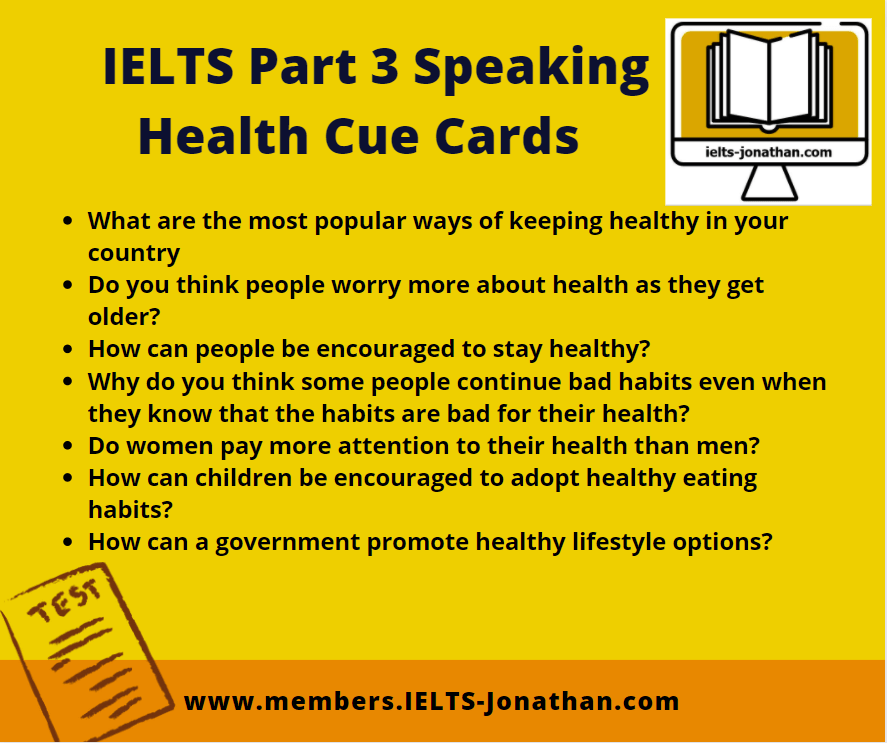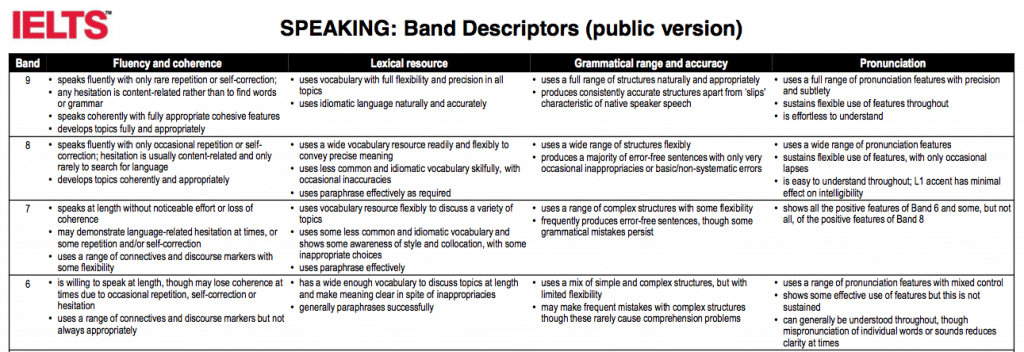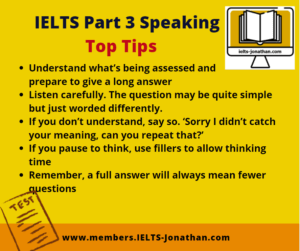IELTS Part 3 Practice Cards and Marking Criteria helping you to do better
Nobody likes being asked complicated questions under pressure!
Part 3 of the speaking test can feel very much like that, so I’ve written some practice cards which cover recent or popular IELTS Part 3 topics.
In my experience, I have found that these can help students perform better.
Being familiar with some of these can help prepare you Part 3 types of question.
Having said that, awareness of assessment is as important as the content in the speaking test, so I’ve made a checklist for the marking criteria too.
You can practice these questions by yourself, but it is better to practice with a partner or a teacher.
You can record yourself with or without a partner, using Flipgrid and compare and comment on each other’s answers.
Remember you need to practice the four Speaking Band scores
IELTS Speaking Criteria Explained
If you want to get a high score in the IELTS Speaking test, it is very important to understand how you will be assessed. This will help you to improve your speaking performance and maximise your score.
How are you assessed in the IELTS speaking test?
There are four IELTS speaking criteria:
- Fluency and Coherence (FC)
- Lexical Resource (LR)
- Grammatical Range and Accuracy (GRA)
- Pronunciation (P)
These four IELTS speaking criteria each relate to a different area of your spoken English skills:
Fluency and Coherence
- How easy is it for you to keep speaking?
- Do you pause or hesitate often when speaking?
- Do your ideas relate to the question?
- Can you link your ideas together?
- Can you explain what you mean, even if you forget the right word?
Lexical Resource
- How wide is your vocabulary?
- How accurately do you use words?
- Do you use collocations accurately?
- Do you use some less common words?
Grammatical Range and Accuracy
- Do you use a range of structures?
- Do you get the word order right?
- Do you use the right tense?
- How often do you make mistakes?
- Do your mistakes make it difficult to understand what you mean?
Pronunciation
- Do you speak clearly?
- How easy are you to understand?
- Do you use stress and intonation accurately?
- Do you use connected speech / link your words together?
You will be given a band score in each of the four areas based on your performance across the whole speaking test. This is then calculated to give you a score across all the four bands.
For example;
FC 7, LR 7, GRA 7, PRON 7 would give you an overall IELTS Speaking Band Score of 7 but
FC 7, LR 7, GRA 6, PRON 7 gives an overall IELTS Speaking Band Score of 6.5.
So, if you want to get Band 7 for speaking then you need to get 7 in each of the four IELTS speaking criteria.
Remember when practicing, it’s even better if you can record yourself to notice the language you use and any errors you make!
Other Speaking Guides
How to Respond and Practice for an IELTS Task 3 question
Part 3 questions consist of a two-way discussion area that develop from the IELTS task 2 prompt you were given.
The examiner will ask between 3 and 6 questions from 2 sets of question banks.
Although IELTS Part 3 is a conversation, the examiner will still expect you to speak in some detail around the topic prompts. Typically, this section lasts between 4 to 5 minutes and is an extension of IELTS Task 2.
These kind of question won’t allow you to give short answers but will require a more developed response. Still, a mistake often made, especially by native speakers, is to give the most basic answer possible when it’s important to display the language you are capable of.
If the examiner believes that you have not attempted a developed answer, or believes you are capable of higher-level language, the examiner might ask ‘Why?’ or ‘How is that so?’
Not answering, or providing language that only displays low-level grammar and vocabulary can mean that three of the IELTS Band Scores could could be penalised.
Things to be aware of
- There is no chance to plan you answer
- but you have more time to provide an answer
- If you naturally speak quickly, slow down a little
- Self-correction is perfectly fine and so is reformulation of a sentence or phrase
Remember, this part of the test is
- to demonstrate your fluency and coherence
- and display complex language and high-level vocabulary
- give the examiners the opportunity to make conclusions about the level of language you are using
- you can use intonation to make your delivery more interesting
- Give yourself extra time with fillers, such as ‘erm’, ‘let me think’
- Don’t let the examiner ask ‘why?’. Give a response, an explanation and an example and keep speaking until they say ‘ Thank you’.
Look at these examples and notice how the answer displays your language ability without having a negative effect.
- Do you think it is important to be good at reading? Why?
‘Oh, Reading is very important! Reading provides opportunities and knowledge, it gives access to a number of important things like education and work opportunities. You know, if somebody is illiterate or not very good at reading, they are generally limited in their life chances, they’re limited to agriculture or manual work. I know there are exceptions of illiterate people who have become successful, but being able to read means you can understand and learn without a teacher, you can get knowledge from books and the internet, can have a profession, read contracts, open bank accounts. I think education should fully encourage people to be ‘good’ readers.’
Top Tips
- Understand what’s being assessed and prepare to give a longer answer
- Listen carefully. The question may be quite simple but is usually just worded differently.
- If you don’t understand, say so. ‘Sorry I didn’t catch your meaning, can you repeat that?’
- If you pause to think, use fillers to allow thinking time
- Remember, a full answer will mean fewer questions
IELTS Speaking Part 3 Topic areas
- Reading
- Television
- Work
- Family
- Sports
- Animals
- Technology
- Communication
- Health
- Travel
IELTS Discussion questions
Choices and Decisions
- What type of decisions do people have to make every day?
- What‘s the best kind of person to advise teenagers before they make big decisions?
- What should people do if they realise they’ve made a bad decision?
- Do you think it’s easier to make a decision as an individual or as a group?
- What do people need to do to reach a good decision as a group?
- Do you think that if individuals disagree with a group decision they should say something?
- Do people learn more from the consequences of making a good or a bad decision?
- Is it better when making decisions to spend time weighing up the consequences rather than relying on feelings?
- Apart from politicians, who should make decisions which have far reaching consequences for society?
Television
- Do you think watching television is a good hobby to have?
- What benefits does watching TV bring to a person?
- How do the shows that are popular now compare to those that were popular ten years ago?
- Do the internet and smartphones mean that TV is no longer necessary?
- Do you think television actors and actresses get too much attention?
- Is it important to be handsome or beautiful to become famous on TV?
- What are the disadvantages of being a television or film celebrity?
- Should parents encourage their children to be famous on television?
Reading
- Where do children in your country usually learn to read?
- What types of stories are children first taught to read?
- Do boys and girls in your country like to read the same types of things?
- Why do some children have difficulty learning to read?
- Do you think it is important to be good at reading? Why?
- Has modern technology helped people read more or less?
- What jobs can people get it they are unable to read or write?
- Are there any benefits to reading comic books? What are they?
Work
- What jobs should pay a high salary?
- What influences a person’s career choice?
- Why do some people choose to do jobs that are dangerous?
- What are the advantages and disadvantages of owning your own business?
- What jobs are less common in your country now as compared to 20 years ago?
- Is it always important to get good marks in school to earn a high salary?
- Some people say that parents should choose their children’s career. Do you agree?
- What jobs do you think will be popular in the future?
Family
- In what ways have families in your country changed in recent years?
- Should husbands and wives have different roles within the family? Why/why not?
- What role do grandparents play in the family in your country?
- Who do you think should be responsible for the care of the elderly – government or family?
- In your country, what sort of things do people do together as a family?
- What do you think the benefits are of doing things together as a family?
- What are the main reasons why people organize family parties in your country?
- In terms of personality, are people more influenced by their family or friends?
Sports
- Do you think people in your country get enough exercise?
- How can we encourage young people to do exercise more and play sports?
- Do you think physical education and sports should play a part in school?
- Do you think it’s better for boys and girls to play sports together or separately?
- How important is it for the government to invest money in training athletes?
- Do you think sports stars are paid more money than they deserve?
- Who do some people enjoy participating in sports more than others do?
- Is it important that athletes try to be good role models for young people?
Communication
- Do you think men and women communicate differently?
- Why do you think people spend so much money buying the latest devices?
- How well can a picture communicate something?
- Does a university education improve a person’s ability to communicate effectively?
- Do people in your country use body language?
- What means of communication are best for sharing bad news?
- What changes have you experienced in the way young people communicate in recent years?
- Compare the advantages and disadvantages of text messaging as a means of communication.
Animals
- Do you think people spend too much time and money on pets?
- What types of things do people like to do with pets in your country?
- Are there laws that protect animals in your country? Can you give an example?
- What is the best way for children to learn about animals and protecting animals?
- Why do people like to visit zoos and watch programs about animals on TV?
- Why is it important for animals and their habitats to be protected?
- Is it okay for scientists to use animals to conduct experiments?
- There are many people in the world who like to hunt and fish. Why do you think they enjoy these activities?
Technology
- How do people in your country use technology for entertainment?
- Do you think that some people use technology for communication too much?
- What differences are there between the attitudes of older and younger people toward technology for communication?
- What kinds of technological developments have made the biggest impact on our lives?
- Do computers make it much easier to study?
- Some people get excited about new technology? Why do you think this is?
- Do you think special effects and animation make movies more entertaining?
- What are some of the problems associated with playing video games?
Health
- What are the most popular ways of keeping healthy in your country
- Do you think people worry more about health as they get older?
- How can people be encouraged to stay healthy?
- Why do you think some people continue bad habits even when they know that the habits are bad for their health?
- Do women pay more attention to their health than men?
- How can children be encouraged to adopt healthy eating habits?
- How can a government promote healthy lifestyle options?
- What is the best way of helping a person with an addiction?
Travel
- How do you think most people usually choose a destination to travel to?
- In your opinion, how will tourism change your country in the future?
- What are the personal benefits of traveling abroad?
- Why do you think people like to travel to different places in their free time?
- Which method of travel do you consider to be the safest?
- What are the pros and cons of low cost air travel?
- What are the benefits and drawbacks of the growing tourism industry?
- Do you think it is important for children to travel and experience new cultures?
I’m Jonathan
I’ve taught IELTS and University English in more than a dozen universities and schools around the world.
I’m a parent, traveller and passionate about language teaching and helping students achieve their dreams.
Whilst living in Austria or working in Asia, I run IELTS courses to help students get to where they want to be.
If you are serious about IELTS, connect with me to see how I can help you.





